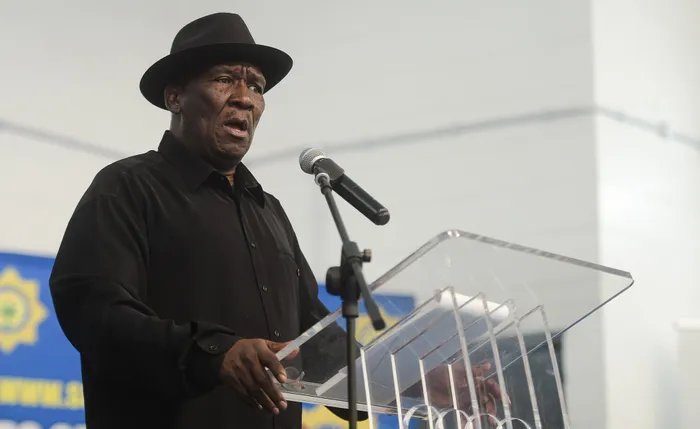Murder is back to levels last seen in 2003

Police Minister Bheki Cele. Picture: Phando Jikelo/African News Agency(ANA)
South Africa’s murder rate is back to the high levels last seen 20 years ago, leaving experts and commentators concerned.
Just two months into the year, South Africans already have to navigate debilitating load shedding, which was recently declared a national disaster, high food prices, heavy rainfall and flooding - and now a 10% increase in murder cases.
Police Minister Bheki Cele released the latest crime stats which show that all contact crimes increased by 11.6%.
Despite the alarming figures, Cele said “the calls by South Africans on the police, to decisively deal with crime are loud and they are clear”.
From October to December 2022, 4 992 suspects were arrested for gender-based violence and femicide (GBVF) related crimes. During the same period 71 accused were handed down 89 life sentences.
A further 219 accused were sentenced between one to nine years imprisonment, culminating in a total of 1 079 years behind bars. Another 143 accused were sentenced between 10 and 19 years imprisonment, a combined sentence of 2 063 years in prison.
While 67 other accused were collectively sentenced to 20 years and more for GBVF related crimes, 52 711 people were arrested for various crimes, including murder, sexual offences, assaults, car hijackings, as well as other serious crimes, during the festive season.
The minister added that SAPS has also finally cleared its historic DNA backlog. He said the DNA backlog which was initially over 241 000 is now at 1 600.
“We have completed the building and capacitation of the laboratory in Gqeberha in the Eastern Cape, which will drastically relieve pressure from the Western Cape laboratory going forward,” he said.
And while Cele said SAPS is, and will continue to intensify intelligence-led operations to take down individuals or organised criminals hell-bent on terrorising communities, the experts are not convinced.
Institute for Security Studies criminologist Lizette Lancaster said the latest crime statistics were alarming.
“Violent crime continues to increase as it has for the past 12 years, but what is particularly alarming is the dramatic increase in violence levels in the past two years since we had the Covid lockdowns,” said Lancaster.
She said the murder rate is now back at levels last seen in 2003 and 2004, “close to the peak of our violence levels”.
“We saw dramatic decreases from around 1994 to 2011, because of firearm controls, illegal firearms being removed from our streets, and when we were able to get on top of robberies and other types of crime.
“In the past 12 years we have seen institutional weaknesses in the criminal justice system. We have seen an increase in vigilante action, organised crime, and specifically armed robberies and this is together with the proliferation of firearms leading to these unacceptably high murder rates.
Lancaster says the murder rate is the best way to measure violence in the country.
“Most murders take place in relatively few locations, so it is possible to substantially reduce murder, and by implication other violent crimes, through targeted policing and prevention strategies. But for this we need strong policing plans and partnerships and we need evidence-based approaches to target specific crime categories and specific hotspots,” she said.
Anti-crime activist Yusuf Abramjee said the latest crime statistics show that life in SA “has become so cheap”.
“Blood, bullets, and bodies have become a way of life. We are on the brink of a mafia state. We have a crisis. If government can have a national disaster for load shedding, I don't see a reason why we don't have a national disaster for crime and lawlessness. The criminal justice system and the slow pace in which it works is contributing to the lawlessness.
“These criminals are running amok and organised crime has become a way of life. South Africans are living in fear and the situation is getting worse,” said Abramjee.
Herman Mashaba, president of ActionSA, said Cele is losing the war on crime and “should lose his job for it”.
“Given the perpetual rise of crime and violence in South Africa under successive ANC governments, the solution is undoubtedly the unseating of the ANC and their replacement with a caring government that is committed to restoring law and order so that South Africans can begin to feel safe and not under siege in their own country, and in their own homes.
“We cannot expect ordinary South Africans to refrain from criminal behaviour when being a criminal seems to be a minimum requirement for becoming a leader in the ANC,” said Mashaba.
Saturday Star